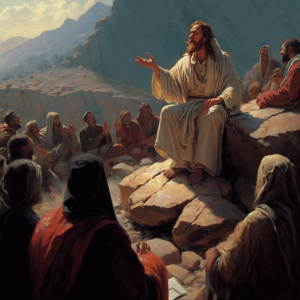Third Sunday of Epiphany 2025 St Andrew’s Milngavie
 Today we celebrated the third Sunday of Epiphany accompanied by Alison.
Today we celebrated the third Sunday of Epiphany accompanied by Alison.
Thank you for all who helped with the prayer breakfast yesterday, it was a great success and despite the weather we had a good turn out.
This Week
Tuesday 10am – Prayer Group in the Garden Room
Thursday 10am – Said Holy Communion followed by coffee in Friendship House.
Readings for next Sunday – Candlemas – Malachi 3:1-5 Hebrews 2:14-18 Luke 2:22-40
Today’s reading – Nehemiah 8:1-3,5-6,8-10, 1 Corinthians 12:12-31, Luke 4: 14-21
I think we can all agree that the storm on Friday was quite something, dramatic and destructive in equal measure.
Throughout bible wind is associated with the presence of God and the Holy Spirit, as witnessed on the Day of Pentecost.
Last Saturday as the electoral synod gathered to discern the appointment of a new bishop, we were encouraged to prayer for the power of the Holy Spirit to work amongst us to reach a conclusion.
Often when we are in the turmoil of a crisis or poised to make significant decisions, it is perhaps easy to forget to pray for the Holy Spirit for guidance. But it is important that do so as the HS is our advocate, our divine help advocate sent to us from God at Pentecost. It is God’s gift to us.
Perhaps we can think of times when we have felt upheld and supported by the spirit. In scripture we are presented by many examples of the work of the spirit.
Yesterday the church celebrated the feast of the Conversion of St Paul. Paul’s conversion from an activist seeking to destroy a nascent Christianity to one of its most significant apostles and initiators of the early church is quite extraordinary and a tangible example of the work of the Holy Spirit.
Today we continue to pray for the HS to call many to Christianity, we need a revival of the Christian faith, a to proclaim the gospel of love forgiveness and salvation to to world in much need of Christ’s salvific love.
This morning’s gospel opens with such a reference as Jesus begins his ministry. “Jesus returned to Galilee in the power of the Spirit, and news about him spread through the whole countryside.” Luke 4:14
Here Jesus goes into the synagogue to preach one of his first sermons and Luke, describing this sets the tone for his gospel clearly in the familiar reference to Isaiah.
“The spirit of the Lord is on me…”, he reads from the book of Isaiah
“To preach good news to the poor
He has sent me to proclaim freedom for the prisoners
And recovery of sight for the blind,
To release the oppressed
To claim the year of the Lord’s favour” Luke 4:18-19
Luke makes it quite clear that Jesus’ ministry is a ministry for the poor, oppressed, marginalised and the sick. They were to be the nerve centre of his calling. Luke immediately dispelled any myth that the Christ, the awaited Messiah would be in any way be a political and powerful figure as in the Old Testament Kings and rulers.
He was not like king David seeking power and leadership. Not like Solomon seeking wealth and building temples and cities. Nor like the military leader of Joshua.
He was different. He would bring the kingdom of God to people through teaching, conversation and healing. No power, no aggression, no money, no politics.
But it was Jesus’ narrative that must have really made people sit up – Blessed are the poor.
This was the first time any one had ever said this, and this is what makes such a remarkable start to Jesus’ ministry. He was just the opposite of what people were expecting. Jesus did not start his ministry with the rulers and those in power, but with a normal ordinary family. And this fact sent a real message of good news for everyone including the sick, the oppressed, the prisoners and the blind.
And it was a special sort of good news. It wasn’t good news in the sense that now your troubles will all be over, it was more the sense of I care about you, and I want others to care about you too. For the first time they had been recognised.
But this was good news not only to the financially poor, but also for the low in spirit, for the downtrodden, those who feel their life is not worthwhile, who see no value in themselves.
The freedom of prisoners wasn’t an amnesty to those who have committed crimes, but the offer of release for those imprisoned by guilt, anxiety, fear. Whilst Jesus did indeed heal the physical ailments of many, he was also speaking to those who have lost their spiritual direction, can’t see clearly the way forward or how their lives can gain greater purpose.
We can all struggle to see the way forward.
And this is what is so wonderful and powerful about Jesus’ message of good news today – God’s love is for everyone – we are all needed and equal in the eyes of God.
In the epistle using the analogy of the body Paul takes up this theme as he emphasis the important of each church member. If a seemingly insignificant part is taken away the whole body becomes less effective. He is emphasising the point we are all needed, we are all part of the one body of Christ.
And as such we are all called to pray for the power of the Holy spirit too uphold our own lives, our circumstances and those of our church and our world
